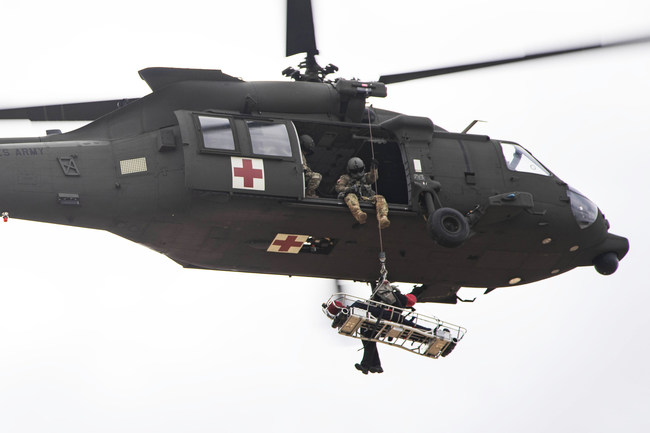BROOMFIELD, Colo. and FORT RUCKER, Ala., Feb. 23, 2021 /PRNewswire/ — The U.S. Army Aeromedical Research Laboratory (USAARL) and Vita Inclinata today announced that the USAARL successfully completed initial prototype flight-testing on Vita’s Load Stability System Litter Attachment (LSS-LA) at Fort Rucker, in support of Cooperative Research and Development Agreement W81XWH-19-0115 and in preparation for Project Convergence 21, the military’s initiative to modernize and transform its operations, which includes future hoist requirements.


Just as important, the successful field tests were the culmination of months of Electromagnetic Interference and Aircraft Compatibility Testing in anechoic chambers, which ultimately concluded that Vita’s LSS Litter Attachment does not interfere with aircraft electronics systems, clearing the way for the LSS-LA to be test flown under Blackhawk HH-60M and UH-60L aircraft.
The LSS-LA performed as designed in hoist insertion and extraction exercises, controlling unpredictable motion without taglines and mitigating as much risk as possible. The system successfully provided crews the ability to remotely orient or rotate the litter, as well as eliminate swing and spin with the touch of a button.
The trials included an empty litter, a litter with a mannequin, and a barrel man (hoist), under relentless rotor wash across multiple scenarios.
“USAARL flight tests medical systems used in the U.S. military medical evacuation environment to ensure safe interactions among the aircraft, medical system, aircrew, and patients,” said David Jones, Director of the Enroute Care Group for USAARL. “The Army needs systems that meet military and industry rotary-wing aircraft standards to ensure safe and effective operations.”
Vita was able to not only test the LSS-LA and train the personnel who would use the system, but in the process also gained invaluable feedback on ergonomic refinements, which the company is already acting upon.
“We are grateful to be rigorously testing our system with the Army MEDEVAC community, because ultimately this is the community that the solution is designed for,” said Derek Sikora, Vita CTO and co-founder, who led the testing for Vita.
“We know that in the field, no two scenarios are alike. Flight crews are constantly communicating, scouting, managing complex unknowns at any given moment. We mitigate at least one unknown: we provide a stable hoist that crews can easily get down and up in a timely manner. The LSS is a tool, not a crutch,” he added.
While the successful field testing was important, the company’s advancements in aircraft compatibility compliance were perhaps the greatest engineering challenge and success Vita has faced. “At times, it felt like chasing ghosts — figuring out where to look, what to try, hunting down the slightest potential interference,” Sikora said. “The development teams really came together to make this happen.”
Video provided by Vita Inclinata shows the successful tests with various types of rescue hoists.
“Taken together, the LSS’ aircraft compatibility and its successful field trials show that our solution immediately de-risks helicopter rescues, whether for other military branches or commercial operations,” said Caleb Carr, Vita Inclinata founder and CEO. “I am incredibly proud of our engineering team, which has punched above its weight to create an intuitive, autonomous stabilization tool that aids first responders in rescuing others.”
In the coming months, the Army will work with Vita engineers to analyze the testing data and prepare further trials with Operational units, with the goal of fleet certification on the horizon. For more information, visit @vitatech.co or https://www.usaarl.army.mil/.
About Vita Inclinata
A friend’s death during a rescue operation — with a helicopter close but unable to stabilize due to weather and terrain — was the genesis of Vita Inclinata. Founded in 2015 as a way to solve a real problem, Vita today controls chaotic swing, oscillation and spin, and adds precision for rotor wing and fixed wing aircraft and cranes. With the mission of “Bring them home, every time,” Vita’s technology changes the narrative while saving lives, time and money across industries, including search and rescue, firefighting, OPSCOM, construction, wind turbines, and oil and gas. The company is headquartered in Broomfield, Colorado, with offices in Washington, DC, and new offices opening in 2021 in Huntsville, Alabama and Wilmington, North Carolina. For more information, please visit www.vitatech.co.
CONTACT:
Meredith Branscombe
292019@email4pr.com
(833) 600-8482, X 707
About the U.S. Army Aeromedical Research Laboratory
The U.S. Army Aeromedical Research Laboratory merges the sciences of aviation and medicine to optimize human protection and performance. The Laboratory seeks to enhance force readiness and effectiveness by preventing or minimizing health hazards created by military systems, doctrine, and tactics. The Laboratory’s unique mix of scientific personnel successfully conduct critical research for solving operationally specific medical problems and provide military developers with information and expertise to enhance the performance and safety of future Army systems. For more information, visit https://www.usaarl.army.mil/.
CONTACT:
USAARL Public Affairs
292019@email4pr.com
SOURCE Vita Inclinata Technologies, LLC

